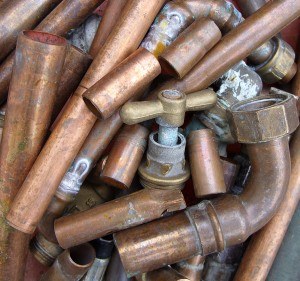

First thieves swiped manhole covers from a new subdivision. Then officials discovered that bronze plaques honoring work done during the Great Depression had been pried from sidewalks at Providence’s largest park. Then a historical marker vanished in Pawtucket.
 Rhode Island has seen a recent rash of metal thefts as the state’s economy continues to limp and while prices for metals like copper remain high thanks to demand overseas. A recent insurance industry study found the state has the nation’s highest rate of insurance claims for metal theft. Local and state leaders have responded with proposals to require scrap dealers to keep records of anyone trying to sell metal.
Rhode Island has seen a recent rash of metal thefts as the state’s economy continues to limp and while prices for metals like copper remain high thanks to demand overseas. A recent insurance industry study found the state has the nation’s highest rate of insurance claims for metal theft. Local and state leaders have responded with proposals to require scrap dealers to keep records of anyone trying to sell metal.
Police say in many cases the thieves are looking to trade stolen metal for a few bucks they can use to buy drugs.
“It’s a highly labor-intensive crime and the reward is relatively small,” said Pawtucket police Maj. Arthur Martins. “We’re not dealing with the Mafia here.”
The crime may be small-time, but the costs to homeowners, utilities, municipal governments and insurance companies can quickly add up. The U.S. Department of Energy estimates that copper wire theft alone costs American businesses at least $900 million a year. Providence had 190 break-ins last year alone that involved the theft of copper wires or pipes.
“People come in, remove the copper from your basement, and then when you turn on the water, the basement gets flooded,” said Providence City Councilman David Salvatore, who proposed a new city ordinance requiring metal dealers to check the ID of anyone seeking to sell scrap metal.
The new law also requires scrapyards to record purchases and hold on to the metal for 10 days before it can be resold or melted down.
Copper theft began to rise around a decade ago as China and other developing nations began using more copper. Copper was selling on the London Metals Exchange for less than $1 per pound in 2002 but hit prices of $4 in 2006. Prices have fluctuated since the economic downturn hit but remain above $3 a pound.
“The higher the market price, the more of this we see,” said David Graves, a spokesman for electric provider National Grid. With so much metal wiring in plain sight, utilities are particularly hard hit by metal theft and have pushed for greater regulations on scrap dealing.
Metal theft has been a problem across the country as thieves pinch sewer grates, street signs, catalytic converters or copper wire – whatever can be sold or melted down. Nearly $500,000 worth of brass cemetery ornaments were stolen in Chicago; Philadelphia lost 2,500 manhole covers and storm water grates in one year.
Overall, Ohio, Illinois and Texas saw the most metal thefts, but when the National insurance Crime Bureau looked at the number of insurance claims for stolen metal it found that Rhode Island has the most claims per capita.
Rhode Island lawmakers have considered a proposal that would prohibit metal dealers from paying cash for any metals worth $500 or more. Senate Majority Leader Dominick Ruggerio, the sponsor of the legislation, said he thinks the poor economy plays a role in metal thefts. The state’s unemployment rate for June was 10.9 percent.
Regulating the scrap metal industry is the only effective way to curb metal theft, according to Brandon Kooi, a professor of criminal justice at Aurora University in Illinois who has studied metal theft.
“Nobody keeps scrap metal for their own possession,” he said. “They have to turn it into cash. We have to make it more difficult for offenders to do.”
Scrap metal theft is a problem for metal dealers, too. Stephen Broomfield, owner of a scrap metal dealership in Providence, said his business works with police and allows officers to inspect their records whenever they ask.
“Our books are open,” Broomfield said.
Martins, the Pawtucket police major, said his department contacted scrap dealers to see whether anyone tried to sell the missing plaque, which marked the site of a historic theater. Its disappearance came after bronze markers were stolen from Roger Williams Park in Providence. Those plaques read “Built by the Works Progress Administration,” a New Deal jobs program that was responsible for constructing the park’s sidewalks and roads.
“These little monuments are all over the place. They’re on buildings, on sidewalks, on bridges,” Martins said. “The best we can do is ask the scrap yards to notify us if something comes in.”